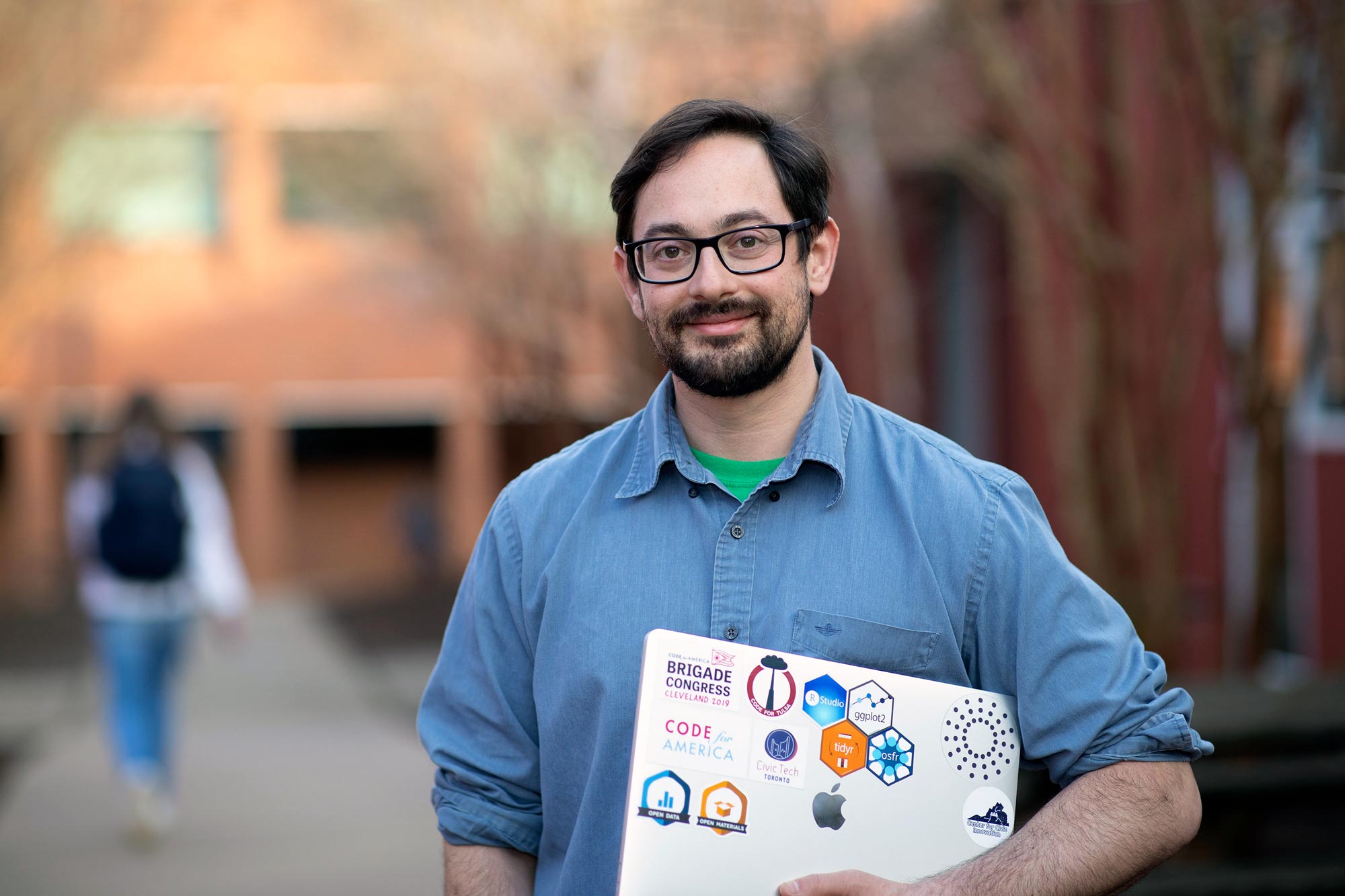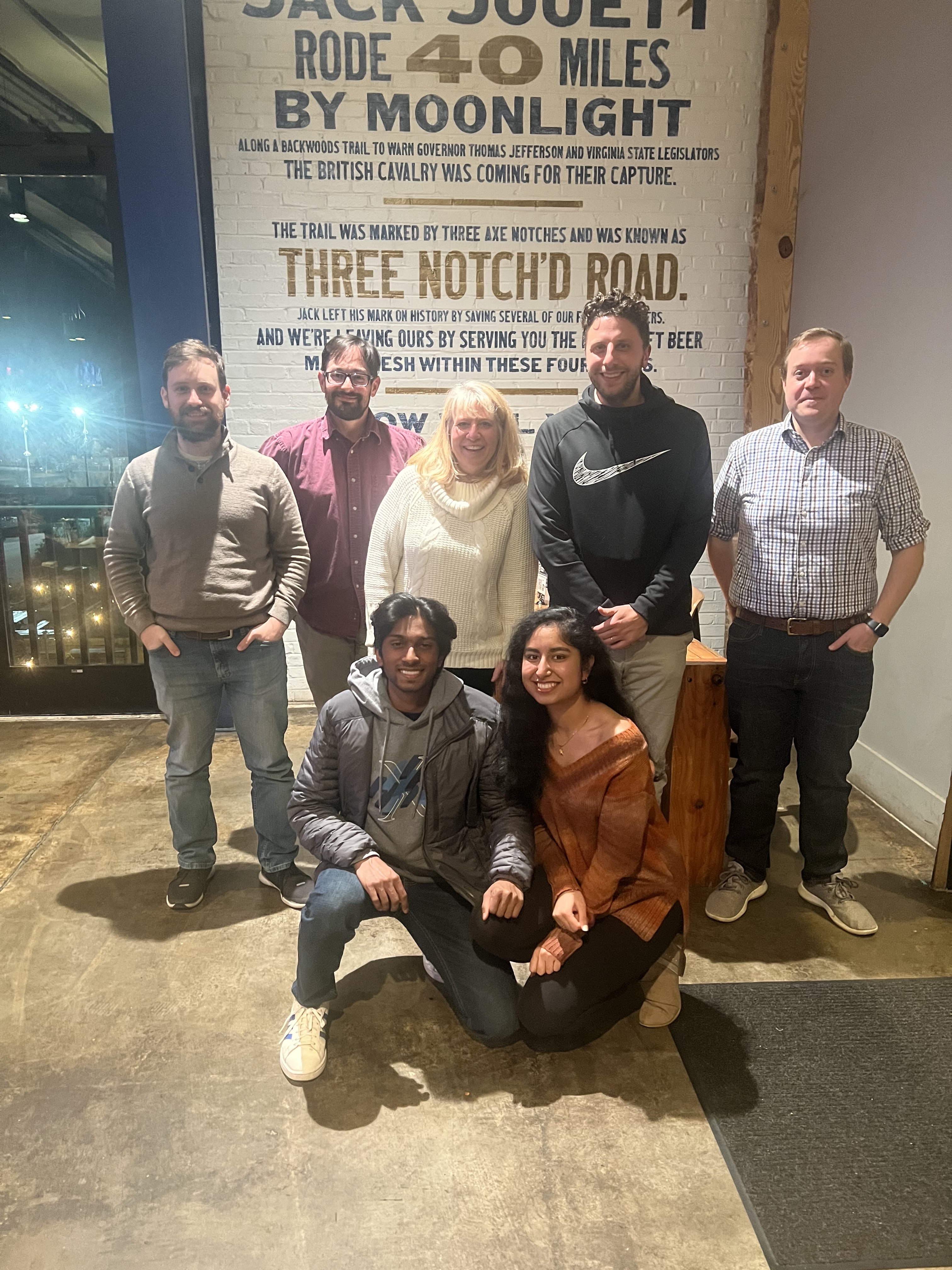Making Tech Work for Everyone: Civic Tech Volunteerism in Charlottesville

Jonathan Kropko is an Assistant Professor at the School of Data Science where he teaches courses and advises students on their capstone projects. Additionally, Jon leads Code for Charlottesville as he works to make a difference in the local community utilizing his quantitative skills as well as his background in math and political science.
Charlottesville is a small town that punches way above its weight when it comes to technology. We have a world-class university, several prominent tech, software, and finance firms, and an impressive new building on the Downtown Mall for dozens of tech startup companies. So in addition to the usual ways that tech changes our lives, we feel the presence of technology in Charlottesville through the prosperity the industry brings to our town and the economic pressure that the influx of money and people places on those who live here. Technology, for all its benefits, creates inequality. Cloud computing, smarter and faster AI, high-powered front-end web design, and other technologies can be very expensive, and as a result, these modern tools aren’t available to organizations that work most with our communities, like local government and area nonprofits.
 In response to this inequality, there is a rising movement called civic tech. The civic tech movement brings volunteers with tech, data, design, and community organizing skills together to work on projects for community-focused organizations. The goal is to break down the barriers that prevent communities from benefiting from technology and to find ways for tech to support, not extract from, local neighborhoods. Whenever possible, civic tech projects use free and open-source software to make these tech projects financially sustainable.
In response to this inequality, there is a rising movement called civic tech. The civic tech movement brings volunteers with tech, data, design, and community organizing skills together to work on projects for community-focused organizations. The goal is to break down the barriers that prevent communities from benefiting from technology and to find ways for tech to support, not extract from, local neighborhoods. Whenever possible, civic tech projects use free and open-source software to make these tech projects financially sustainable.
There are civic tech projects happening everywhere. One national nonprofit, Code for America, has more than 80 local chapters across the United States, and each chapter is doing the work of recruiting and organizing volunteers and cultivating community partnerships to run civic tech projects.
In California, Code for America created a website called GetCalFresh.org that guides people who qualify for the SNAP food security program through the arduous process of filling out the official paperwork to enter the program. The Code for America chapter in Tulsa created software called CourtBot (www.court.bot) that provides text-message reminders to help people in the court system avoid failure-to-appear and failure-to-pay fines. Code for America volunteers here in Charlottesville, as well as in Vermont, Ohio, Boston, and other places are working with legal aid nonprofits to expand programs that help people clear their criminal records and get better access to job, housing, and financial opportunities.

The Charlottesville chapter of Code for America launched in September 2019 and has completed projects with the Charlottesville Fire Department and Office of Human Rights, the Legal Aid Justice Center, the Haven, Charlottesville Community Bikes, and many local nonprofits that work with communities in Charlottesville and Central Virginia. We have several ongoing projects and others we are preparing to launch in the spring. One current project is in collaboration with the Charlottesville Climate Protection Program and the Pubic Works Department: we are acquiring and processing data on the location of all of the streetlights in Charlottesville along with information such as the type of bulb and fixture on each poll, and we are building a web-enabled dashboard that maps the streetlights and calculates the total energy expenditure and cost of the network. The dashboard will be used to assess how and when to replace bulbs to make the network more energy efficient to lower the long-term costs to the city.

Code for Charlottesville is a 100% volunteer organization with financial and material support from the University of Virginia School of Data Science and from Oracle. Our volunteers have a wide variety of skills. Some of us are UVA students and some work for local tech companies or local government. Some of us have decades of experience and others are just starting out. Some of us are software engineers or data scientists, and others are designers, community organizers, or people who are really interested in what happens in our city and region. Starting in March 2020 we began doing all of our work remotely over Zoom, and that has had the advantage of allowing us to build a volunteer network that expands beyond Charlottesville: we have regular volunteers who live in California, Colorado, Florida, and other places. In the next few months, we will be holding more events in person while using our well-practiced remote working skills to maintain and expand this larger volunteer network.
 If you would like to join us, there are many ways to help! Although we are “Code for” Charlottesville, coding is only one of the skills we need to do our work. Sign up on our website codeforcville.org for more information and to get started. We have an active community on the messaging app Slack where most of our conversations happen, and we will make sure you are included.
If you would like to join us, there are many ways to help! Although we are “Code for” Charlottesville, coding is only one of the skills we need to do our work. Sign up on our website codeforcville.org for more information and to get started. We have an active community on the messaging app Slack where most of our conversations happen, and we will make sure you are included.
Code for Charlottesville exists to serve Charlottesville and Central Virginia and the communities that call this place home. We aim to deepen the culture of civic tech volunteerism here, and to work with a healthy and growing tech industry to make tech work for everyone.
- Guastavino Tile at the University of Virginia
- Abraham Lincoln on Character, Leadership and Education
- Silence is Golden: Celebrating the History of Silent Films
- UVA Northern Virginia Programs Fair
- UVA Club of Los Angeles: Influential Communication
- UVA Club of Atlanta: Cavs Care - Love Your Park at Wilson Mill Park